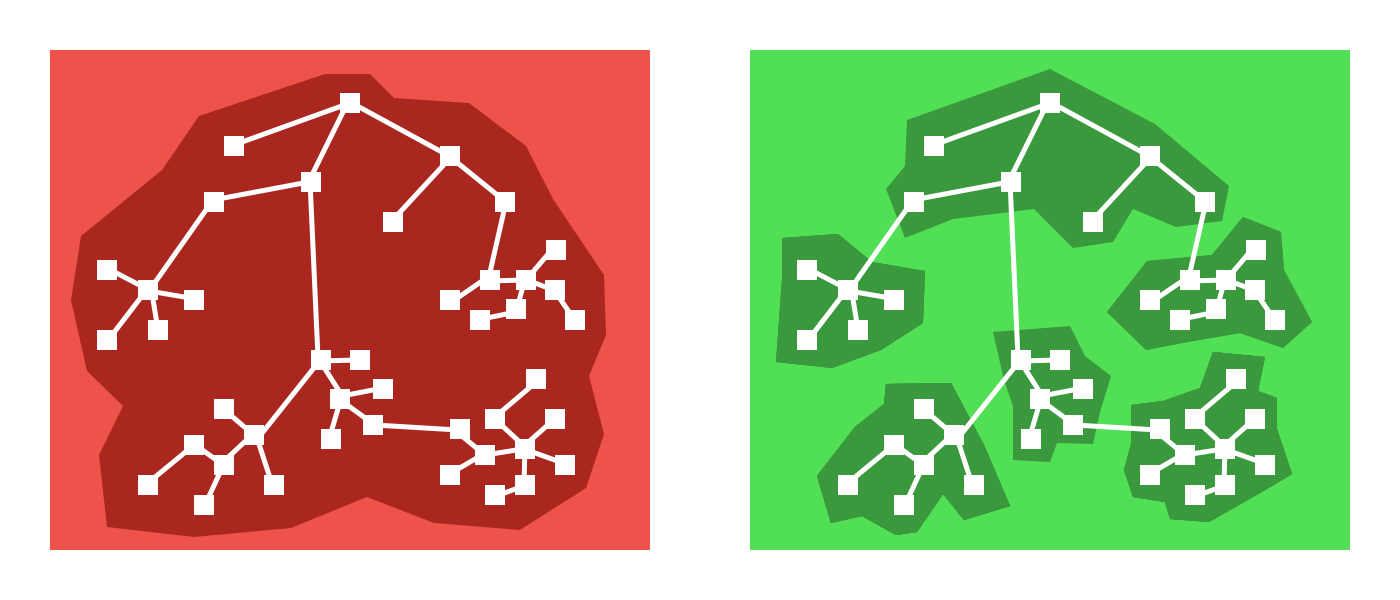JavaScript Modules explained
js modules
commonjs
umd
module bundler
ES6 modules
amd
Browserify
Webpack
Rollup
What are modules?
- small units of independent, reusable code
- highly self-contained with distinct functionality, allowing them to be shuffled, removed, or added as necessary, without disrupting the system as a whole
- Good authors divide their books into chapters and sections; good programmers divide their programs into modules
Benefits
- Reusability
- Maintainability
- Dependency resolution
- Encapsulation (namespacing)
Anonymous closure
(function(){
// todo
}())(function($){
// jQuery plugin
}(jQuery))- creates own closure
- can access global variables
- can declare local variables without accidentally overwriting existing global variables
CommonJS
server oriented
- Standard designed by volunteer working group
- Node.js uses CommonJS modules
- Synchronous
// testModule.js
function testModule() {
this.hello = function() {
return 'hello!';
}
this.goodbye = function() {
return 'goodbye!';
}
}
module.exports = testModule;// consumer.js
const test = require('testModule');
const testModuleInstance = new test();
testModuleInstance.hello(); // 'hello!'
testModuleInstance.goodbye(); // 'goodbye!'Asynchronous Module Definition (AMD)
browser oriented
// consumer.js
define(['myModule'], function(myModule) {
myModule.hello();
myModule.goodbye();
});
/* Alternative syntax */
define(function (require) {
const myModule = require('myModule');
myModule.hello();
myModule.goodbye();
});// myModule.js
define([], function() {
return {
hello: function() {
return 'hello';
},
goodbye: function() {
return 'goodbye';
}
};
});-
In many cases it uses AMD as a base, with special-casing added to handle CommonJS compatibility
-
capable of working on both client and server
Universal Module Definition (UMD)
both client and server
(function (root, factory) {
if (typeof define === 'function' && define.amd) {
// AMD
define([], factory);
} else if (typeof exports === 'object') {
// CommonJS
module.exports = factory();
} else {
// Browser globals (Note: root is window)
root.returnExports = factory();
}
}(this, function () {
// Methods
function private(){};
function hello(){};
function goodbye(){};
// Exposed public methods
return {
hello: hello,
goodbye: goodbye
}
}));ES2015 Modules
- compact and declarative syntax
- asynchronous loading
- better support for cyclical dependencies
- imports are live read-only views of the exports
- Downside: use use a transpiler for use in browser
// testModule.js
export default function testModule() {
function hello() {
return 'hello!';
}
function goodbye() {
return 'goodbye!';
}
}
// consumer.js
import testModule from 'testModule';
// or
import { hello } from 'testModule'; import React, { Component } from 'react';
class App extends Component {
render() {
return (
<div>Hello World!</div>
);
}
}
export default App;Module bundling/loading
Simply put, it is the process of grouping modules (and their dependencies) into a single file (or group of files) in the correct order.
Webpack
- New kid on the block
- Super popular
- Offers additional features such as code splitting and treeshaking

// testModule.js
export default function testModule() {
function hello() {
return 'hello!';
}
function goodbye() {
return 'goodbye!';
}
}
// consumer.js
import { hello } from 'testModule'; // testModule.js
export default function testModule() {
function hello() {
return 'hello!';
}
}Tree shaking
Which one wins?
¯\_(ツ)_/¯
- There isn't a single winner
- Competition breeds innovation
- The web has always succeeded on having multiple ways of doing things
Resources
- JavaScript Modules: A Beginner's Guide, Preethi Kasireddy
https://medium.freecodecamp.com/javascript-modules-a-beginner-s-guide-783f7d7a5fcc#.t5pfp5lmf - Brief history of JavaScript Modules, SungTheCoder
https://medium.com/@sungyeol.choi/javascript-module-module-loader-module-bundler-es6-module-confused-yet-6343510e7bde#.1ddueq67z - Understanding JavaScript Modules
https://spring.io/understanding/javascript-modules
JavaScript Modules explained
By Carlos Filoteo
JavaScript Modules explained
- 635



